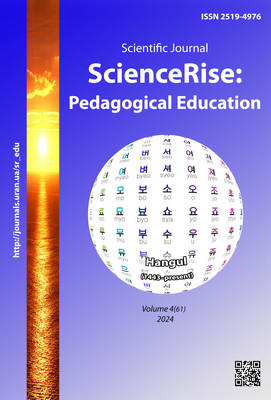Specialized internet resources in the professional training of future teachers of music art
DOI:
https://doi.org/10.15587/2519-4984.2024.313876Keywords:
music, music teacher, digital technologies, internet resources, specialized internet resources, professional training, music-pedagogical education, Ukraine, ChinaAbstract
The article provides an overview of the use of specialized Internet resources in music-pedagogical education for the professional training of future music teachers in Ukraine and China. In Ukraine, higher education institutions utilize a wide range of specialized Internet resources, with a preference for non-commercial ones. These resources are effectively integrated into the educational process, used for teaching professional and methodical disciplines, facilitating educational and research work, and encouraging independent creativity among students. Digital and specialized Internet resources are recognized as a key aspect of modernizing the educational process in all higher musical and pedagogical institutions. However, challenges, such as the absence of Ukrainian localization in popular projects and inadequate technical support in educational institutions, complicate the use of these resources. Additionally, using Internet resources with artificial intelligence is in the early testing and active discussion stage in Ukraine. In China, alongside international Internet resources (limited due to national requirements), a wide range of localized or adapted Internet resources is utilized in music-pedagogical education. These specialized Internet resources are primarily used in teaching special educational disciplines of the professional training cycle. The systematic use of artificial intelligence in musical and pedagogical education in China is particularly noteworthy. The technological advantages of using specialized Internet resources in the training of future music teachers have been established, including accessibility and cross-platform compatibility, real-time updates, less need for device resources, deployment speed and scalability, instant access and ease of use, saving memory on the user's device, simplicity in support, and security. These advantages have implications for the methodological features of their use in music and pedagogical education, which require further research
References
- Sulaieva, N. V., Levchenko, H. S., Lobach, O. O., Hlushkova, S. I., Hryn, Yu. M., Demianko, N. Yu. et al. (2020). Zmistovyi skladnyk formalnoi profesiinoi osvity vchyteliv muzychnoho mystetstva (I osvitnii riven). Kyiv: Talkom, 294.
- Ponomarova, N., Khaitsziuan, L. (2024). Digital resources in professional pedagogical education. New Collegium, 114 (2), 43–48. https://doi.org/10.34142/nc.2024.2.43
- Sobchenko, T. (2022). Use of digital services and tools in the process of professional training of future music teachers. Scientific Journal of Khortytsia National Academy, 2 (7), 93–100. https://doi.org/10.51706/2707-3076-2022-7-10
- Dobroskok, I., Nalyvaiko, O., Rybalko, L., Zhernovnykova, O. (2020). Introduction of Digital Resources in the Process of Training Musicians-Teachers in Educational Institutions of the People’s Republic of China. Professional Education: Methodology, Theory and Technologies, 12, 66–89. https://doi.org/10.31470/2415-3729-2020-12-66-89
- Havrilova, L. (2016). Updating methods of musical education in future music teachers’ professional training in the context of modern art education informatization. Profesionalizm pedahoha: teoretychni y metodychni aspekty, 4, 14–24.
- Baranovskaya, I. G., Mozgaleva, N. G., Baranovskiy, D. N., Bordiuk, O. N. (2021). Use of ict in the process of distance learning for future teachers of the art of music. Naukovi zapysky. Seriia: pedahohichni nauky, 150, 21–37. https://doi.org/10.31392/nz-npu-150.2021.02
- Sadruddin, M. M. (2019). Munir’s Taxonomy of Digital Learning. SSRN Electronic Journal. https://doi.org/10.2139/ssrn.3754995
- Free Online Resources for Music Education (2022). NAfME. Available at: https://nafme.org/blog/free-online-resources-for-music-education/
- Pećanac, R., Jeremić, B., Milenović, Z. (2016). Digital media in the teaching of music education. The New Educational Review, 43 (1), 236–247. https://doi.org/10.15804/tner.2016.43.1.20
- Proshkin, V. (2017). Educational web resources in prospective teachers’ professional training. Osvitolohichnyi dyskurs, 1-2 (16-17), 183–197.
Downloads
Published
How to Cite
Issue
Section
License
Copyright (c) 2024 Nataliia Ponomarova, Li Haijuan

This work is licensed under a Creative Commons Attribution 4.0 International License.
Our journal abides by the Creative Commons CC BY copyright rights and permissions for open access journals.
Authors, who are published in this journal, agree to the following conditions:
1. The authors reserve the right to authorship of the work and pass the first publication right of this work to the journal under the terms of a Creative Commons CC BY, which allows others to freely distribute the published research with the obligatory reference to the authors of the original work and the first publication of the work in this journal.
2. The authors have the right to conclude separate supplement agreements that relate to non-exclusive work distribution in the form in which it has been published by the journal (for example, to upload the work to the online storage of the journal or publish it as part of a monograph), provided that the reference to the first publication of the work in this journal is included.







